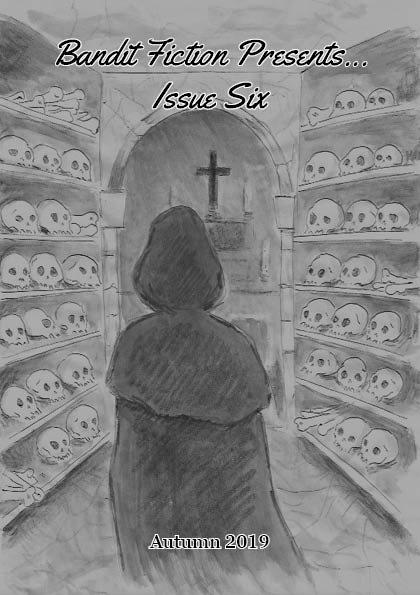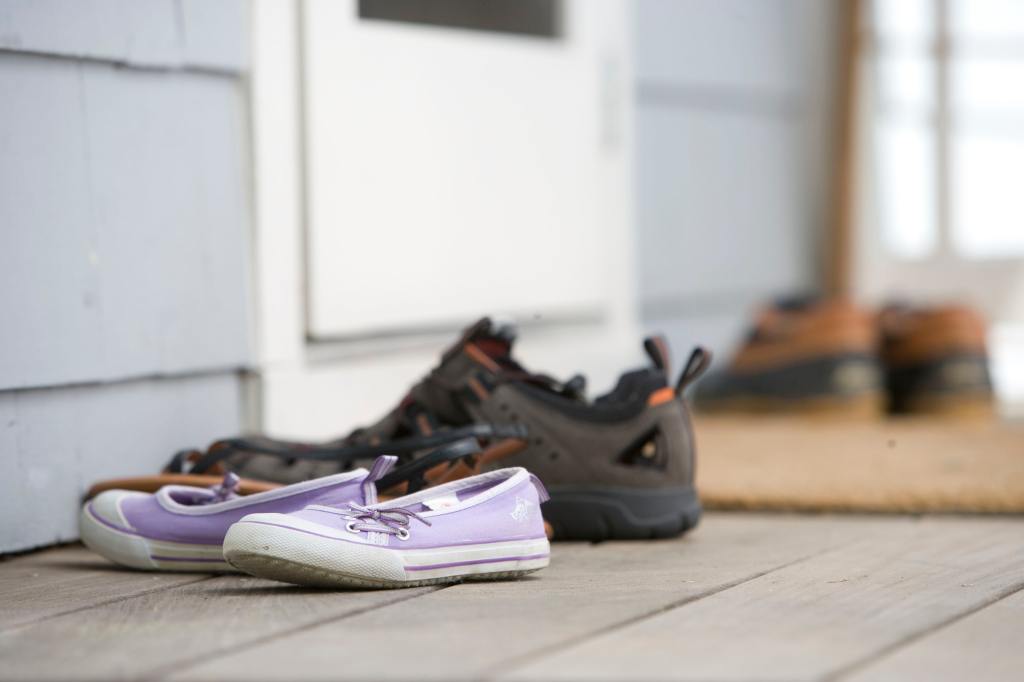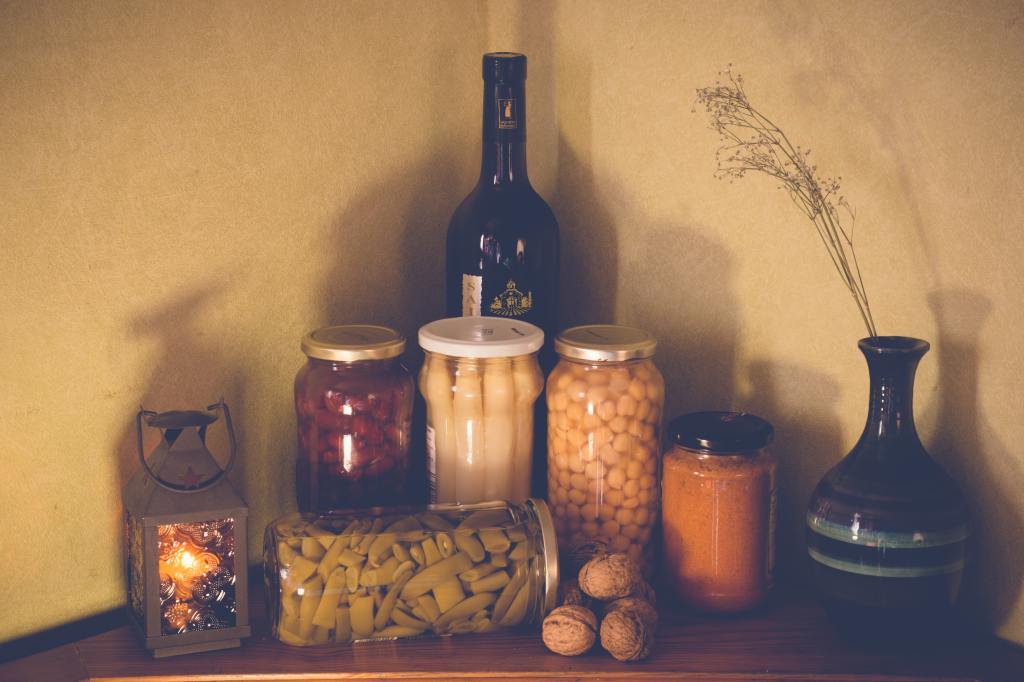
The first time I saw the spider, I was two bites into a midnight bowl of store-brand generic Cheerios. Movement caught my eye, something fast and primal, flashing behind years-old jars of pasta Lisa had left behind. I rolled up a magazine and pushed aside one of the jars, raised the magazine to strike, then froze. The spider was bigger than my outstretched hand, bigger than I realized was possible, like something you see on one of those nature shows hosted by an affable blonde Australian. My rolled-up magazine was unlikely to do anything other than anger the spider. I needed to think.
Taking advantage of my hesitation, the spider eased back behind the jars. I could see it through the glass, wavy and distorted, like it was underwater. I traded the magazine for a sneaker and nudged the jars to encourage it to come out again, but instead it darted across the countertop towards the corner and hid behind the toaster. I was annoyed now. It was late and I wanted my cereal, which grew more soggy by the moment. Fighting fear and disgust, I yanked the toaster back, and now it was trapped in the corner, nowhere to go and nothing else to hide behind. I raised the sneaker, and the spider, obeying some kind of ancient instinct, raised its front two legs and pawed at the air in a defense gesture.
Spiders don’t have faces, or at least not ones you can see. But I imagined it squinting, anticipating my death blow. It struck me, then, that I was several thousand times the mass of the spider, and here I was, convinced it was “huge,” convinced I was trying to kill it out of self-defense. I looked at it, cowering in the corner, tiny legs waving ineffectually in front of itself like an overmatched boxer, desperate to live without even knowing why.
I took a step back and relaxed my grip on the sneaker. Keeping an eye on the spider, I edged over to the door to the garage and opened it.
“Go to the garage,” I said. “Lots of good bugs to eat.”
The spider didn’t move. I tentatively tried to nudge it towards the door, but it only pulled its legs in tighter and compressed itself further into the corner. I sighed and closed the door.
“Okay,” I said. “But tomorrow you have to go.”
I finished my cereal, turned off the lights, and went to bed, where I lay awake thinking about the softball-sized spider now having free reign in my kitchen. Once or twice, I thought I could actually hear it rustling around out there. In the morning, there was no sign of it, and I forgot about it as my day unspooled. But that night, it appeared again in the corner just before midnight. This time I had my cereal anyway, undaunted but wary. When I stood up to put my bowl in the dishwasher, the spider shifted slightly, and as I sat back down at the kitchen table, it shifted again. I realized that it was turning towards me as I moved. It was watching me.
I tried shooing it out the garage door again, this time with a broom, but again, it wouldn’t budge. I even tried to shove it, but the bristles of the broom passed right over it as if it were a brick.
“Let’s not make this a habit,” I said, before turning off the lights and going to bed.
But a habit it became. Not every night, but maybe two or three times a week, just before midnight, it would appear, watch me as I ate my cereal, and refuse to move even if I tried to nudge it towards the door. I soon gave up trying.
One night, long before midnight as I sat on the couch composing and then deleting unsent texts to Lisa, I had a feeling it was there, and turned to find it splayed on the wall above the jars, slightly closer to where I sat. It remained there until I went to bed. A few nights later, it appeared again on the wall, closer still, and even earlier. After that, the only constant was the place: always the kitchen. But now it could be anytime, day or night.
I was no longer frightened of or repulsed by the spider, but I didn’t want it surprising me, and it seemed to know this. We reached a kind of agreement, it seemed. There were times I needed something from the cupboard or the countertop it haunted, but I never saw it on those occasions. I didn’t really ‘cook,’ but if I needed to boil up some pasta water or make pancakes, it stayed out of my way. When I needed my kitchen, I had my kitchen. When I didn’t, the spider was there. I often found it in the decorative glass bowl Lisa’s least-favorite aunt had gifted us, the one with three colored glass apples in it, spread across the apples almost possessively. One afternoon, basking in the rays of the sun coming through the kitchen window, it stretched its legs, causing the glass apples to softly clink together.
One day when I was fiddling in the garage with my broken air compressor, a project I had half-heartedly started a few times in the last year, I found a dead cricket on the ground. I was about to sweep it outside with my foot, and then reconsidered. When I dropped it on the kitchen countertop, the spider took a few cautious steps from behind the jars, then pounced on the cricket and carried it into the glass bowl, but not before pausing and turning toward me. Thanking me? Maybe I just imagined that.
I’m not a very social person, but once a month I have a chili night with a few work friends. My turn to host came around, and I spent several evenings in the kitchen, working on a new recipe. The first dry run did not go well – way too much vinegar – and I began to worry I was going to let the group down. The spider must not have liked all the activity. I didn’t see it while I was working, and with the pressure mounting to get the recipe right, I forgot all about it.
The final recipe was a hit. Carl Philbert, junior systems developer, had a second serving, then went back to the kitchen for a third. “I think he likes it,” said Jaiden, database administrator.
“It’s not the best recipe I’ve ever had,” I said, fishing for compliments.
“Holy shit!” Carl suddenly shouted from the kitchen. I remembered the spider, and a cold panic seized me. I pushed my way past a few people and found Carl in front of my fridge. “You had a Camaro?” he asked, pointing at the picture of high school me standing with my brother in front of his car, which I’d affixed to the fridge with free magnets from Sonny’s Bar-B-Que.
“Firebird,” I said, relieved. I scanned the wall above the jars. “It was my brother’s.”
“He still have it?”
I shook my head. “Sold it years ago.”
A few people joined us to have a look. I suddenly became aware of how many people were in my house, my kitchen, and I became uneasy. I wanted them gone.
“Well, anyway,” I said loudly, to nobody in particular. I’ve always understood a loud “Well anyway” to be code for “It’s time for whatever we’re doing to end.” We wandered back into the living room, and within the hour the last person had left.
Alone again, I started to pick up empty bottles and heard a slight clink from the glass bowl in the kitchen. There it was. Damned if it didn’t look bigger.
***
What I think I had, according to the internet, was a heteropoda venatoria. A huntsman spider, indigenous to Australia, Southeast Asia, Hawaii, and other tropical places. They’re an invasive species in the southern U.S., but the maps I found showed their range stopping well south of North Carolina. But nothing else matched. It wasn’t hairy and bulky like a tarantula, who in any case shouldn’t be in North Carolina either, and was much bigger than a Carolina wolf spider. Did you know that when huntsmans give birth, the mother will keep her young with her for a week, feeding them and teaching them how to hunt? Then they go off on their own to live their spider lives. I also read that when they’re trying to attract a mate, a male can make its abdomen vibrate and create a hum. That’s a pretty cool trick.
***
I rent. The good thing about that is if the water heater leaks or the AC craps out, you call the landlord. I woke one morning to a puddle in the kitchen, which I traced to the pipes under the sink. I probably could’ve fixed it myself, to be honest. You can find a YouTube video for anything. But the landlord is the one who has the equity, not me. I called him, and he called a plumber. When the plumber showed up, I let him do his thing in the kitchen, keeping a subtle watch on him while I pretended to work on my laptop.
“All good,” he said, after just twenty minutes.
“That fast?”
“Just a pinhole leak. This place has copper pipes,” he said, almost accusatorily. “They all leak eventually.”
I thanked him and told him to bill Ray the landlord. He said, “Oh yeah, I didn’t want to touch it, but you got the biggest spider I’ve ever in the cabinets under there. Gave me a hell of a fright. It’s okay, though. It’s dead.”
“Oh?” I said. I didn’t know what else to say, so I repeated, “Oh?”
“Yeah, don’t worry about it.”
After he left, I went to the kitchen, squatted in front of the sink, and opened the cabinets. There it was, in a corner, with its legs drawn in close to its body. The deep rich brown color and black spots were gone. It looked bleached and frail. I looked at it for a long time, and then very gently scooped it up with both hands. I couldn’t believe how light it was. I’d always imagined it had the heft of a frog, maybe even a gerbil. With its legs extended, it must have been the size of a soccer ball; but it had almost no weight to it at all, and was fragile to the point of disintegration. All that size, that life, now gone. It was a ghost spider.
As I worked at the university, it wasn’t hard to look up professors from the Entomology Department, and my tentative email to Dr. Alderson, the department chair, was returned with enthusiasm. Yes, she said. Please bring it to me. So I did. I covered it in tissues and lowered it into a shoebox, and took it to campus the next day.
“It’s definitely a huntsman,” Dr. Alderson confirmed in her office. “A female. I can only imagine she hitched a ride from Florida with some oranges or bananas on their way to a grocery store. They get pretty big down there, but I’ve never seen one this size. Usually cold weather will kill them, but a girl this size must be made of stronger stuff.”
She lifted its forelegs with a pen, studied its abdomen under a magnifying glass, periodically shaking her head in wonder.
“So what do you think got her, then?” I asked. “Just old age?”
She raised her head. “I’m sorry. I thought you knew. This isn’t a dead spider. This is just an exoskeleton, a molt. She outgrew this body.”
“You mean it’s – she’s – ”
“Still alive,” she said. “Alive and growing. In winter, too. It really doesn’t add up.”
She thanked me for bringing in the exoskeleton, and made me promise to send pictures if I saw the spider again. I drove straight back home. I was due at work, but home was close. I looked in the tall fescue around the garage for crickets, but we’d just had a week of freezing temperatures. All I could find was a single dead beetle. I took it inside and left it on the kitchen counter, then hustled back to work.
***
A week passed with no spider. Dr. Alderson had said that they’re vulnerable after molting, so they tend to hide until their new exoskeleton hardens. I’d gone to the pet store and bought live crickets to release in the under-sink cabinets, but that proved to be a disaster, as within an hour they were hopping and flying all over the house like a living cloud. I tried collecting or swatting them, but gave up and went to bed.
I woke sometime in the night, thirsty. I tottered into the kitchen and downed a glass of water, only fully waking up as I fell back into bed. The house was silent. I’d fallen asleep to the buzz and thrum of crickets. Maybe crickets sleep through the night, I thought.
But soon after that, I heard a sound from the kitchen: a gentle clinking of glass.
My bedside clock glowed 2:17. I had hours and hours still to sleep. I stretched my arms and legs in my warm bed, then rolled onto my right side – my favorite side – to sleep.
Clink. Like a toast between friends in an adjacent room
Clink.
She was alive. She was home. And she was still growing.
About The Author
Justin Bryant’s recent fiction has appeared in Vol. 1 Brooklyn, Monkeybicycle, Modern Literature, and VLAK Magazine. He is the author of the 2013 memoir ‘Small Time’ (Bennion Kearny, UK). He lives in Raleigh, North Carolina, with his partner Sarah and their dogs Roxy and Bryce.
Bandit Fiction is an entirely not-for-profit organisation ran by passionate volunteers. We do our best to keep costs low, but we rely on the support of our readers and followers to be able to do what we do. The best way to support us is by purchasing one of our back issues. All issues are ‘pay what you want’, and all money goes directly towards paying operational costs.






















Leave a Reply